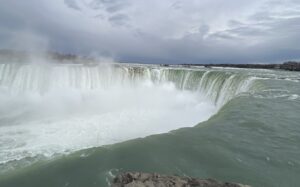Standing at the brink of the Canadian side of Niagara Falls for my first time, I was taken by the awe-inspiring spectacle of water thundering down into the abyss. The mist spraying onto my face felt both invigorating and chilling, a vivid reminder of nature’s raw power and elegance. This was not my first visit to the falls; I had been here several times before, yet the experience was as mesmerizing and profound as ever, perhaps even more so from this fresh perspective.
From where I stood, the view was a vibrant picture of water, mist, and foliage. The vast white curtain of the falls contrasted starkly with the differing greens of the water and the trees clinging to the banks. Small twigs and patches of foliage, caught in the relentless flow, danced chaotically toward the edge of the falls. Every detail, from the largest roar of the water to the smallest leaf swirling paint a picture of dynamic beauty, reflecting the always changing dance of nature.
This visit was particularly reflective, bringing back vivid memories of my first visit to Niagara Falls many years ago on the American side with my father. Standing there with him as a 12 year old boy, I felt an initial sense of wonder that has deeply influenced my perception of nature. Now, revisiting the falls from a new vantage point on the Canadian side, I recognized that different perspectives can profoundly alter and enrich our experiences. This shift in viewpoint provided a deeper understanding of the falls’ majesty, expanding my appreciation for this natural wonder.
As I breathed in the cool, misty air, my thoughts turned to Thoreau and his writings in Walden, where he advocates for a deep, personal connection with nature. Thoreau saw the act of observing nature as a reflective, almost meditative practice, integrating the observer’s subjectivity into the experience. This type of observation and personal reflection was precisely what I was experiencing—a vivid, personal reconnection with nature, grounded in the sensory and emotional landscape around me.
Thoreau emphasized being fully present and awake to capture the essence of the natural world. Standing here at Niagara Falls, I felt a profound alignment with this philosophy. The thunderous cascade of water, the serene greenery, and the frothy turmoil of leaves and twigs below—all served as potent reminders of life’s transient yet timeless nature. My observations went beyond the mere visual; they became a deep, introspective journey reflecting my inner thoughts and memories.
Capturing this moment with a photograph, I knew that no single image could encompass the depth of what I felt. However, it could serve as a gateway back to this experience, a visual anchor to the emotions and revelations encountered here. This experience, like Thoreau’s vivid depictions in Walden, was not just an observation of nature but an intimate dialogue with it. It reminded me that each interaction with the natural world is a personal voyage, one that resonates with our thoughts, invokes our memories, and deepens our connection to the earth. Here at Niagara Falls, from a new perspective, I was reminded once again of the beauty and profound complexity of nature, a perpetual source of inspiration and wonder in my life.

